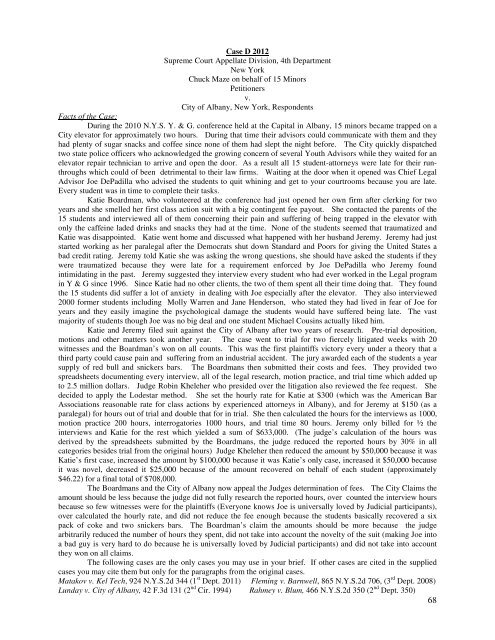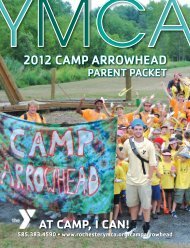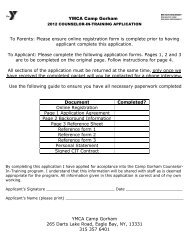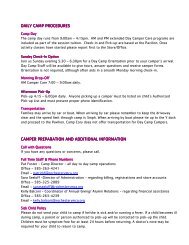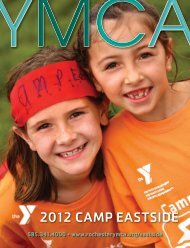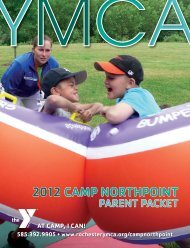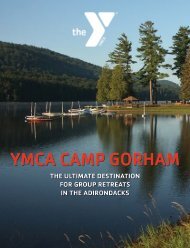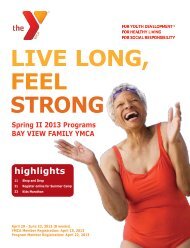2012 Conference Executive Record Report.pdf - YMCA of Greater ...
2012 Conference Executive Record Report.pdf - YMCA of Greater ...
2012 Conference Executive Record Report.pdf - YMCA of Greater ...
Create successful ePaper yourself
Turn your PDF publications into a flip-book with our unique Google optimized e-Paper software.
Case D <strong>2012</strong><br />
Supreme Court Appellate Division, 4th Department<br />
New York<br />
Chuck Maze on behalf <strong>of</strong> 15 Minors<br />
Petitioners<br />
v.<br />
City <strong>of</strong> Albany, New York, Respondents<br />
Facts <strong>of</strong> the Case:<br />
During the 2010 N.Y.S. Y. & G. conference held at the Capital in Albany, 15 minors became trapped on a<br />
City elevator for approximately two hours. During that time their advisors could communicate with them and they<br />
had plenty <strong>of</strong> sugar snacks and c<strong>of</strong>fee since none <strong>of</strong> them had slept the night before. The City quickly dispatched<br />
two state police <strong>of</strong>ficers who acknowledged the growing concern <strong>of</strong> several Youth Advisors while they waited for an<br />
elevator repair technician to arrive and open the door. As a result all 15 student-attorneys were late for their runthroughs<br />
which could <strong>of</strong> been detrimental to their law firms. Waiting at the door when it opened was Chief Legal<br />
Advisor Joe DePadilla who advised the students to quit whining and get to your courtrooms because you are late.<br />
Every student was in time to complete their tasks.<br />
Katie Boardman, who volunteered at the conference had just opened her own firm after clerking for two<br />
years and she smelled her first class action suit with a big contingent fee payout. She contacted the parents <strong>of</strong> the<br />
15 students and interviewed all <strong>of</strong> them concerning their pain and suffering <strong>of</strong> being trapped in the elevator with<br />
only the caffeine laded drinks and snacks they had at the time. None <strong>of</strong> the students seemed that traumatized and<br />
Katie was disappointed. Katie went home and discussed what happened with her husband Jeremy. Jeremy had just<br />
started working as her paralegal after the Democrats shut down Standard and Poors for giving the United States a<br />
bad credit rating. Jeremy told Katie she was asking the wrong questions, she should have asked the students if they<br />
were traumatized because they were late for a requirement enforced by Joe DePadilla who Jeremy found<br />
intimidating in the past. Jeremy suggested they interview every student who had ever worked in the Legal program<br />
in Y & G since 1996. Since Katie had no other clients, the two <strong>of</strong> them spent all their time doing that. They found<br />
the 15 students did suffer a lot <strong>of</strong> anxiety in dealing with Joe especially after the elevator. They also interviewed<br />
2000 former students including Molly Warren and Jane Henderson, who stated they had lived in fear <strong>of</strong> Joe for<br />
years and they easily imagine the psychological damage the students would have suffered being late. The vast<br />
majority <strong>of</strong> students though Joe was no big deal and one student Michael Cousins actually liked him.<br />
Katie and Jeremy filed suit against the City <strong>of</strong> Albany after two years <strong>of</strong> research. Pre-trial deposition,<br />
motions and other matters took another year. The case went to trial for two fiercely litigated weeks with 20<br />
witnesses and the Boardman’s won on all counts. This was the first plaintiffs victory every under a theory that a<br />
third party could cause pain and suffering from an industrial accident. The jury awarded each <strong>of</strong> the students a year<br />
supply <strong>of</strong> red bull and snickers bars. The Boardmans then submitted their costs and fees. They provided two<br />
spreadsheets documenting every interview, all <strong>of</strong> the legal research, motion practice, and trial time which added up<br />
to 2.5 million dollars. Judge Robin Kheleher who presided over the litigation also reviewed the fee request. She<br />
decided to apply the Lodestar method. She set the hourly rate for Katie at $300 (which was the American Bar<br />
Associations reasonable rate for class actions by experienced attorneys in Albany), and for Jeremy at $150 (as a<br />
paralegal) for hours out <strong>of</strong> trial and double that for in trial. She then calculated the hours for the interviews as 1000,<br />
motion practice 200 hours, interrogatories 1000 hours, and trial time 80 hours. Jeremy only billed for ½ the<br />
interviews and Katie for the rest which yielded a sum <strong>of</strong> $633,000. (The judge’s calculation <strong>of</strong> the hours was<br />
derived by the spreadsheets submitted by the Boardmans, the judge reduced the reported hours by 30% in all<br />
categories besides trial from the original hours) Judge Kheleher then reduced the amount by $50,000 because it was<br />
Katie’s first case, increased the amount by $100,000 because it was Katie’s only case, increased it $50,000 because<br />
it was novel, decreased it $25,000 because <strong>of</strong> the amount recovered on behalf <strong>of</strong> each student (approximately<br />
$46.22) for a final total <strong>of</strong> $708,000.<br />
The Boardmans and the City <strong>of</strong> Albany now appeal the Judges determination <strong>of</strong> fees. The City Claims the<br />
amount should be less because the judge did not fully research the reported hours, over counted the interview hours<br />
because so few witnesses were for the plaintiffs (Everyone knows Joe is universally loved by Judicial participants),<br />
over calculated the hourly rate, and did not reduce the fee enough because the students basically recovered a six<br />
pack <strong>of</strong> coke and two snickers bars. The Boardman’s claim the amounts should be more because the judge<br />
arbitrarily reduced the number <strong>of</strong> hours they spent, did not take into account the novelty <strong>of</strong> the suit (making Joe into<br />
a bad guy is very hard to do because he is universally loved by Judicial participants) and did not take into account<br />
they won on all claims.<br />
The following cases are the only cases you may use in your brief. If other cases are cited in the supplied<br />
cases you may cite them but only for the paragraphs from the original cases.<br />
Matakov v. Kel Tech, 924 N.Y.S.2d 344 (1 st Dept. 2011) Fleming v. Barnwell, 865 N.Y.S.2d 706, (3 rd Dept. 2008)<br />
Lunday v. City <strong>of</strong> Albany, 42 F.3d 131 (2 nd Cir. 1994) Rahmey v. Blum, 466 N.Y.S.2d 350 (2 nd Dept. 350)<br />
68


